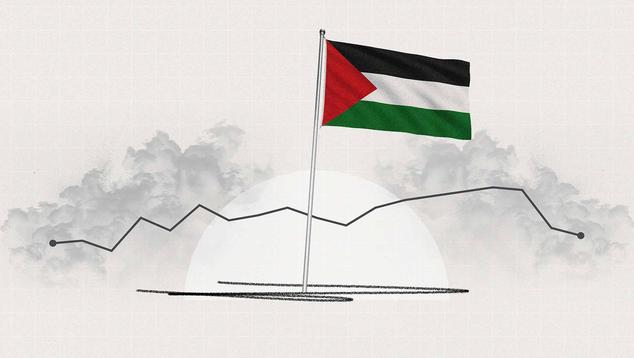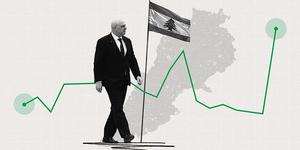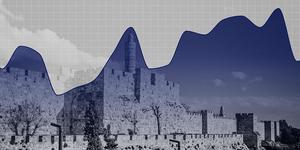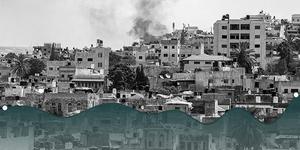This article is the third in a series about life in Israel and in the West Bank and East Jerusalem almost two years after Hamas attacked Israel on Oct. 7 and the Israel-Hamas war began. Read about attitudes toward peace and the two-state solution and Israeli life since the war.
Note: Gallup’s past surveys in the State of Palestine have included Gaza. Gallup was not able to survey Gaza in 2024 or 2025 because of ongoing security issues. The data in this article represent the views of Palestinians living in the West Bank and East Jerusalem. Jewish Israeli-majority areas within the West Bank and East Jerusalem were not included.
LONDON — Since the Oct. 7, 2023, attacks, Israel’s military response has been predominantly centered on the Gaza Strip. But the effects of the Israel-Hamas war have been felt more widely by Palestinians in the West Bank and East Jerusalem.
In Gallup’s latest survey in the State of Palestine, new data reveal numerous ways in which daily life is becoming more difficult for Palestinians in the West Bank and East Jerusalem and how their views toward foreign powers have shifted during the conflict.
Inability to Afford Food, Shelter at Record Highs
In 2025, a record-high 43% of Palestinians in the West Bank and East Jerusalem say they have struggled to afford food at times in the previous year, up from 33% in 2024 and 28% before the Israel-Hamas war began. This sharp rise in difficulty affording food comes against the backdrop of a severe economic downturn and rising poverty, which the World Bank says are making it increasingly challenging for Palestinians to meet their basic needs.
These findings conform with concerns about access to food in the West Bank expressed by the U.S.-based World Food Programme, citing military activity, displacement, and restrictions on the movement of Palestinians as contributing factors.
Palestinians’ difficulty affording adequate shelter has not risen as much as difficulty affording food since 2023. However, there has been a longer-term, gradual increase in this challenge. In 2025, 20% of Palestinians in the West Bank and East Jerusalem report struggling to provide adequate shelter for themselves and their families, twice the level from a decade ago (10% in 2015).
Widespread Pessimism About the Economy and Living Standards
Palestinians in the West Bank and East Jerusalem have been more pessimistic about their economic prospects since 2024 compared with previous years. In 2025, three in four Palestinians (75%) say their local economic circumstances are getting worse, broadly in line with 2024 (80%) and significantly higher than at any point between 2007 and 2023 (Gallup finished fieldwork in the State of Palestine in August 2023, predating the Oct. 7 attacks).
Perceptions of people’s own living standards are not as negative as those about the wider economy, but 51% now say their standard of living is getting worse — the first time on record that more than half of Palestinians in the West Bank and East Jerusalem have felt this way.
These feelings align with a recent World Bank report, which found that the West Bank economy contracted by 17% in 2024 because of greater restrictions on the movement of Palestinians, reduced access to Israel’s labor market, and greater fiscal instability.
Negative Emotions Rise
Palestinians in the West Bank and East Jerusalem are experiencing more emotional strain since the Israel-Hamas war began. In 2025, reports of sadness (35%), worry (52%) and stress (50%) each jumped by at least 10 percentage points compared with 2023, while anger also rose, up eight points to 44%. All four negative emotions remain above their longer-term averages in the West Bank and East Jerusalem.
Palestinians Divided on Safety Perceptions
Feelings of safety have declined notably in the aftermath of the Israel-Hamas war. In 2023, 71% of Palestinians said they felt safe walking alone at night in their area, which fell to 56% in 2024. Since then, safety perceptions have largely remained at the reduced level, with a narrow majority this year (53%) saying they feel safe walking alone at night.
Not since 2009 have fewer Palestinians in the West Bank and East Jerusalem reported feeling safe walking alone. After that year, feelings of safety gradually increased to a record high in 2022. Those gains have been lost since Oct. 7.
Since the war in Gaza began, violence and instability have also been rising in the West Bank. In the first half of this year, 149 Palestinians were killed in the West Bank by Israeli forces or settlers, while nine Israelis were killed by Palestinians, according to the U.N.
Law, Order, Conflict Most Serious Issue in West Bank and East Jerusalem
For the first time, Gallup asked people this year to name the No. 1 issue facing their respective countries, in their own words. More than half of adults in the West Bank and East Jerusalem (55%) name issues related to law and order, including violence, war and conflict.
Slightly under a third of Palestinians mention an economic issue (19%) or something to do with the job market or working conditions (12%). While conflict and instability remain present on the minds of Palestinians in the West Bank and East Jerusalem, the economic downturn — which, itself, is linked to the wider conflict — is still seen a major issue by many.
Palestinians Widely Disapproving of Foreign Powers
Palestinians in the West Bank and East Jerusalem have dim views of foreign powers. In 2025, 7% express approval of U.S. leadership, and 9% approve of German leadership. It is very rare for the average approval ratings of these two Western powers to be below 10% in the history of Gallup’s global tracking.
Palestinians have typically viewed Berlin in a more positive light than Washington, albeit still at low levels.
However, Palestinians are also negative toward many other global powers asked about in the World Poll. Other regional powers such as Iran (30%), Qatar (29%), Saudi Arabia (15%) and the United Arab Emirates (15%) all receive minority approval, as do Russia (20%) and China (31%). While Palestinians in the West Bank and East Jerusalem have a more positive view of their own leadership (36%), a majority (55%) still disapprove.
For the first time, Gallup also asked people this year about their perceptions of the United Nations. This question was asked slightly differently than the question about the leadership of other countries, with “it depends” and “unaware” being volunteered responses. Even so, a majority of Palestinians (63%) disapprove of the U.N., more than three times the percentage who approve (18%).
Bottom Line
Public opinion among Palestinians in the West Bank and East Jerusalem has changed considerably since Hamas’ attacks on Oct. 7 sparked the war in Gaza. The economic downturn generated by wider instability means that most Palestinians are now deeply pessimistic about the economy and their living standards. Against this backdrop, inability to afford food has risen to a record high, negative emotions have climbed, and perceived public safety has fallen. Amid deepening hardship, Palestinians have adopted an overwhelmingly negative view of the international community.
Stay up to date with the latest insights by following @Gallup on X and on Instagram.
For complete methodology and specific survey dates, please review Gallup's Country Data Set details. Learn more about how the Gallup World Poll works.




